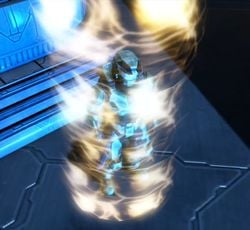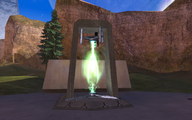Slipspace translocation: Difference between revisions
From Halopedia, the Halo wiki
No edit summary |
No edit summary |
||
| Line 1: | Line 1: | ||
{{Era|Forerunner|HCW|Post}} | {{Era|Forerunner|HCW|Post}} | ||
[[File:Teleportation Grid.JPG|thumb|250px|Someone translocating via teleportation grid.]] | [[File:Teleportation Grid.JPG|thumb|250px|Someone translocating via teleportation grid.]] | ||
'''Slipspace translocation''',<ref name="goo">'''[[Halo: Ghosts of Onyx]]''', ''pages 311-212''</ref> more commonly known as '''teleportation''', is a method of travel that allows the user to travel nearly instantaneously between locations. This is achieved through the use of [[slipspace]] as a travel medium, without the use of a conventional [[ | '''Slipspace translocation''',<ref name="goo">'''[[Halo: Ghosts of Onyx]]''', ''pages 311-212''</ref> more commonly known as '''teleportation''', is a method of travel that allows the user to travel nearly instantaneously between locations. This is achieved through the use of [[slipspace]] as a travel medium, without the use of a conventional [[slipspace drive]]. The [[Forerunner]]s were the first known civilization to make extensive use of teleportation technology. Later on, this technology was reverse-engineered by the [[Covenant Empire|Covenant]]. | ||
==Mechanics== | ==Mechanics== | ||
Slipspace translocation technology does not actually [[Wikipedia:Teleportation|"teleport"]] its users by dematerializing them and re-building them in another location; rather, it encases them in a compressed slipstream field, transporting them from one position to another almost instantaneously. This happens much in the same way that a spaceship uses slipspace to travel between star systems - time passes for the individual, but due to the short distances involved it is negligible.<ref name="goo"/> The uncertainty errors involved in translocation are known to cause sensations of being put back together again "from a million pieces" after a transition.<ref>'''Halo: The Flood''', ''page 237''</ref> In addition, the process typically causes feelings of nausea and disorientation on humans.<ref>'''Halo: Ghosts of Onyx''', ''page 316''</ref> | Slipspace translocation technology does not actually [[Wikipedia:Teleportation|"teleport"]] its users by dematerializing them and re-building them in another location; rather, it encases them in a compressed slipstream field, transporting them from one position to another almost instantaneously. This happens much in the same way that a spaceship uses slipspace to travel between star systems - time passes for the individual, but due to the short distances involved it is negligible.<ref name="goo"/> The uncertainty errors involved in translocation are known to cause sensations of being put back together again "from a million pieces" after a transition.<ref>'''Halo: The Flood''', ''page 237''</ref> In addition, the process typically causes feelings of nausea and disorientation on humans.<ref>'''Halo: Ghosts of Onyx''', ''page 316''</ref> | ||
== | ==Applications== | ||
One of the most basic forms of translocation system is the [[teleporter]], a device that allows transit between two fixed points. The Forerunners used several types of teleporters as a form of transport on their various installations, including the [[Halo Array]] and the [[shield world]]s.<ref>'''Halo Wars''', campaign level ''[[Beachhead (Halo Wars level)|Beachhead]]''</ref> Many Forerunner facilities are also equipped with [[teleportation grid]]s, which enable transportation across the installation without the use of teleporters,<ref>'''[[Halo: Combat Evolved]]''', campaign level, ''[[Two Betrayals]]''</ref> instead using a network of "telemetry clusters" placed throughout the installation to keep the grid operational.<ref>[https://halo.xbox.com/en-us/news/headline/the-halo-bulletin-11911-/290676 '''Halo Waypoint''': ''The Halo Bulletin: 11/9/11'']</ref> Forerunner warriors also employed teleportation systems when deploying to the battlefield.<ref>'''Halo Legends''', ''Origins Part I''</ref> | |||
The Forerunners also built [[slipspace portal]]s, a large-scale application of translocation technology. Portals allow transporting enormous amounts of mass between two fixed points, across interstellar distances.<ref>'''Halo: Cryptum''', ''page 200''</ref> | |||
The Covenant also managed to reverse-engineer Forerunner translocation technology to a limited degree, using it in their [[Covenant spire|spire]] battlefield installations, which contain a teleportation system linked to a nearby [[capital ship]], used to transport dropships or other vehicles to the ground.<ref>'''[[Halo: Reach]]''', campaign level, ''[[Tip of the Spear]]''</ref> The [[gravity throne]]s used by the [[Hierarchs]] are known to possess short-range teleportation devices as a form of defensive measure.<ref>'''[[Halo 2]]''', campaign level, ''[[Regret (level)|Regret]]''</ref> | |||
==Trivia== | ==Trivia== | ||
| Line 20: | Line 19: | ||
<gallery> | <gallery> | ||
File:Halo2Vistateleporter.png|A typical teleporter node. | File:Halo2Vistateleporter.png|A typical teleporter node. | ||
File:Phantom Teleport.jpg|A [[Type-52 Troop Carrier|Phantom]] teleporting through a Covenant | File:Phantom Teleport.jpg|A [[Type-52 Troop Carrier|Phantom]] teleporting through a Covenant spire. | ||
</gallery> | </gallery> | ||
==List of appearances== | |||
*''[[Halo: Combat Evolved]]'' {{1st}} | |||
*''[[Halo 2]]'' | |||
*''[[Halo 3]]'' | |||
*''[[Halo Wars]]'' | |||
*''[[Halo: Reach]]'' | |||
*''[[Halo: The Flood]]'' | |||
*''[[Halo: Ghosts of Onyx]]'' | |||
*''[[Halo Legends]]'' | |||
**''[[Origins]]'' | |||
==Sources== | ==Sources== | ||
Revision as of 01:19, November 14, 2011
Slipspace translocation,[1] more commonly known as teleportation, is a method of travel that allows the user to travel nearly instantaneously between locations. This is achieved through the use of slipspace as a travel medium, without the use of a conventional slipspace drive. The Forerunners were the first known civilization to make extensive use of teleportation technology. Later on, this technology was reverse-engineered by the Covenant.
Mechanics
Slipspace translocation technology does not actually "teleport" its users by dematerializing them and re-building them in another location; rather, it encases them in a compressed slipstream field, transporting them from one position to another almost instantaneously. This happens much in the same way that a spaceship uses slipspace to travel between star systems - time passes for the individual, but due to the short distances involved it is negligible.[1] The uncertainty errors involved in translocation are known to cause sensations of being put back together again "from a million pieces" after a transition.[2] In addition, the process typically causes feelings of nausea and disorientation on humans.[3]
Applications
One of the most basic forms of translocation system is the teleporter, a device that allows transit between two fixed points. The Forerunners used several types of teleporters as a form of transport on their various installations, including the Halo Array and the shield worlds.[4] Many Forerunner facilities are also equipped with teleportation grids, which enable transportation across the installation without the use of teleporters,[5] instead using a network of "telemetry clusters" placed throughout the installation to keep the grid operational.[6] Forerunner warriors also employed teleportation systems when deploying to the battlefield.[7]
The Forerunners also built slipspace portals, a large-scale application of translocation technology. Portals allow transporting enormous amounts of mass between two fixed points, across interstellar distances.[8]
The Covenant also managed to reverse-engineer Forerunner translocation technology to a limited degree, using it in their spire battlefield installations, which contain a teleportation system linked to a nearby capital ship, used to transport dropships or other vehicles to the ground.[9] The gravity thrones used by the Hierarchs are known to possess short-range teleportation devices as a form of defensive measure.[10]
Trivia
In most of the Halo games, the effects associated with teleportation involve an intense yellow-orange glow and similarly colored rings that surround the object being teleported. In Halo: Reach, the glow is more subdued and blue-purple in color. It also follows the shape of the object being teleported more closely.
Gallery
A Phantom teleporting through a Covenant spire.
List of appearances
- Halo: Combat Evolved (First appearance)
- Halo 2
- Halo 3
- Halo Wars
- Halo: Reach
- Halo: The Flood
- Halo: Ghosts of Onyx
- Halo Legends
Sources
- ^ a b Halo: Ghosts of Onyx, pages 311-212
- ^ Halo: The Flood, page 237
- ^ Halo: Ghosts of Onyx, page 316
- ^ Halo Wars, campaign level Beachhead
- ^ Halo: Combat Evolved, campaign level, Two Betrayals
- ^ Halo Waypoint: The Halo Bulletin: 11/9/11
- ^ Halo Legends, Origins Part I
- ^ Halo: Cryptum, page 200
- ^ Halo: Reach, campaign level, Tip of the Spear
- ^ Halo 2, campaign level, Regret


